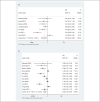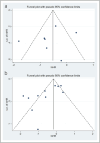Predictive Value of Tumor Regression Grading on the Prognosis of Neoadjuvant Chemotherapy for Locally Advanced Gastric Cancer: A Systematic Review and Meta-Analysis
- PMID: 40365993
- PMCID: PMC12330353
- DOI: 10.14309/ctg.0000000000000860
Predictive Value of Tumor Regression Grading on the Prognosis of Neoadjuvant Chemotherapy for Locally Advanced Gastric Cancer: A Systematic Review and Meta-Analysis
Abstract
Introduction: Tumor regression grade (TRG) after neoadjuvant chemotherapy is recognized as a significant and favorable prognostic indicator in various cancer types. However, this relationship remains less defined and has not been systematically investigated in locally advanced gastric cancer (LAGC). To address this gap, we conducted a meta-analysis aimed at assessing the prognostic influence of tumor regression after preoperative therapy on disease-free survival (DFS) and overall survival (OS) among patients with LAGC.
Methods: A systematic search was conducted across the following databases: PubMed, Web of Science, Embase, Cochrane, WF, CNKI, SinoMed, and VIP. The primary outcomes included DFS and OS, estimated using hazard ratios (HRs) and corresponding 95% confidence intervals (CIs). Subsequently, either the fixed-effects model or the random-effects model was used to compute HR and 95% CI based on the results of heterogeneity analysis.
Results: A total of 11 studies, comprising 2,733 patients, were included in the final analysis. The results indicated that a lower TRG was associated with prolonged DFS (HR 0.53, 95% CI 0.32-0.88) and prolonged OS (HR 0.59, 95% CI 0.39-0.87) in patients with LAGC who received neoadjuvant chemotherapy. Sensitivity analysis demonstrated that no single study significantly influenced the results for both DFS and OS. Publication bias was identified in the meta-analysis for OS, whereas no publication bias was detected in the meta-analysis for DFS.
Discussion: A lower TRG score is associated with improved DFS and OS in patients with LAGC receiving neoadjuvant chemotherapy.
Keywords: local advanced gastric cancer; meta-analysis; neoadjuvant chemotherapy; overall survival; tumor regression grade.
Copyright © 2025 The Author(s). Published by Wolters Kluwer Health, Inc. on behalf of The American College of Gastroenterology.
Conflict of interest statement
Figures






References
-
- Smyth EC, Nilsson M, Grabsch HI, et al. Gastric cancer. Lancet 2020;396(10251):635–48. - PubMed
Publication types
MeSH terms
Grants and funding
- 202310313050Z/Jiangsu Training Program of Innovation and Entrepreneurship for Undergraduates
- 82203172/National Natural Science Foundation of China
- 82273334/National Natural Science Foundation of China
- 81871869/National Natural Science Foundation of China
- 81400055/National Natural Science Foundation of China
LinkOut - more resources
Full Text Sources
Medical
Miscellaneous

